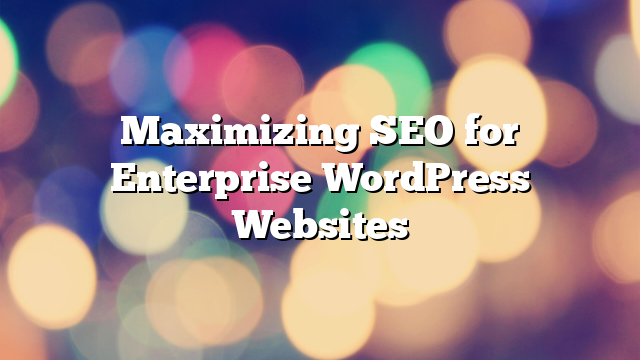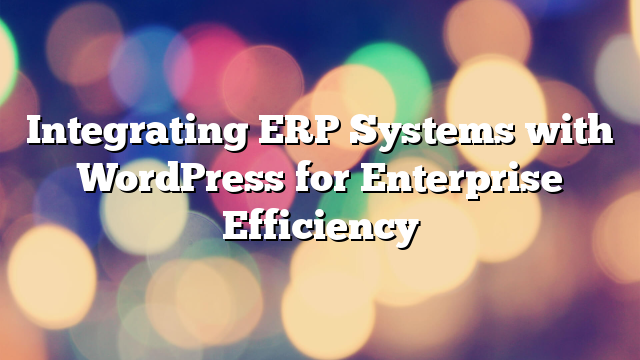Maximizing SEO for Enterprise WordPress Websites
19.12.2024

Search engine optimization (SEO) plays a critical role in driving traffic, generating leads, and enhancing the online visibility of enterprise websites. WordPress, known for its flexibility and robust SEO features, is an excellent platform for enterprises looking to dominate search engine rankings. This article explores strategies to maximize SEO performance on enterprise WordPress websites.
Why SEO Matters for Enterprise Websites
For enterprises, SEO is more than just ranking on search engines. It’s about connecting with target audiences, building authority, and achieving long-term growth. Strong SEO ensures your website is accessible, relevant, and trustworthy to both users and search engines.
WordPress as an SEO-Friendly Platform
WordPress offers numerous built-in SEO advantages. From customizable permalinks to a variety of SEO plugins, enterprises have the tools needed to optimize their websites effectively. Its clean code and mobile-friendly themes further enhance search engine compatibility.
Top SEO Strategies for Enterprise WordPress Websites
1. Perform Comprehensive Keyword Research
Begin with in-depth keyword research to identify terms your target audience searches for. Use tools like Google Keyword Planner, Ahrefs, or SEMrush to uncover high-volume, low-competition keywords. Incorporate these strategically into your content, meta tags, and headings.
2. Optimize On-Page SEO
On-page SEO ensures each webpage is search-engine-friendly. Key elements include:
- Using primary and secondary keywords in titles, headings, and meta descriptions.
- Structuring content with proper header tags (H1, H2, H3).
- Adding alt text to images for accessibility and SEO.
- Internal linking to enhance site navigation and crawlability.
3. Leverage SEO Plugins
WordPress offers powerful plugins like Yoast SEO and Rank Math to help optimize your website. These plugins provide guidance on meta tags, readability, and keyword density while generating XML sitemaps for search engine indexing.
4. Optimize Site Speed
Site speed is a significant ranking factor. Use tools like Google PageSpeed Insights or GTmetrix to identify performance issues. Implement solutions such as:
- Using caching plugins like WP Rocket.
- Optimizing images with compression tools like ShortPixel.
- Minifying CSS, JavaScript, and HTML files.
5. Implement Schema Markup
Schema markup enhances search engine understanding of your content, enabling rich results like star ratings, FAQs, and more. Use plugins like Schema Pro or manually add schema markup to highlight key information.
6. Prioritize Mobile Optimization
With mobile-first indexing, ensuring your site performs well on mobile devices is essential. Choose responsive WordPress themes and test mobile usability using Google’s Mobile-Friendly Test tool.
7. Build Quality Backlinks
Backlinks remain a cornerstone of SEO. Focus on earning high-quality, relevant backlinks by:
- Publishing authoritative content that attracts natural links.
- Engaging in guest blogging on reputable websites.
- Creating shareable resources like infographics or whitepapers.
8. Optimize for Local SEO
For enterprises with physical locations, local SEO is vital. Register with Google My Business, optimize location-based keywords, and ensure your contact information is consistent across all directories.
9. Create High-Quality Content
Content is the foundation of SEO. Publish well-researched, original content that provides value to your audience. Use blogs, case studies, and video content to keep users engaged and improve dwell time.
10. Monitor and Analyze Performance
Use tools like Google Analytics and Google Search Console to track SEO performance. Regularly review metrics such as organic traffic, bounce rate, and keyword rankings to refine your strategies.
Overcoming SEO Challenges for Enterprise Websites
1. Managing Large Volumes of Content
Enterprise websites often have extensive content, making optimization complex. Use a content audit to identify gaps, outdated pages, and opportunities for improvement.
2. Balancing SEO with User Experience
Over-optimizing for search engines can harm user experience. Strive for a balance by creating content that satisfies both search engines and users.
3. Addressing Technical SEO Issues
Enterprises need to stay on top of technical SEO elements such as site structure, canonical tags, and crawl errors. Conduct regular technical audits to maintain website health.
4. Keeping Up with Algorithm Changes
Search engine algorithms evolve frequently. Stay informed about updates and adjust your strategies accordingly to maintain rankings.
Conclusion
Maximizing SEO for enterprise WordPress websites requires a comprehensive approach that combines technical expertise, strategic planning, and continuous monitoring. By leveraging WordPress’s SEO-friendly features and implementing best practices, enterprises can achieve higher visibility, attract more traffic, and drive meaningful business results.
Looking to enhance your enterprise website’s SEO? Contact AllWebDev today and let our experts help you achieve your digital goals!



